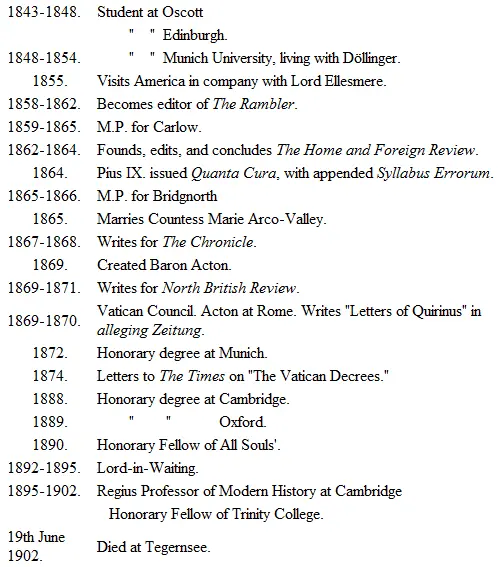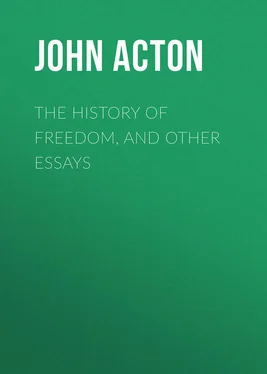John Acton - The History of Freedom, and Other Essays
Здесь есть возможность читать онлайн «John Acton - The History of Freedom, and Other Essays» — ознакомительный отрывок электронной книги совершенно бесплатно, а после прочтения отрывка купить полную версию. В некоторых случаях можно слушать аудио, скачать через торрент в формате fb2 и присутствует краткое содержание. Жанр: foreign_antique, foreign_prose, Историческая проза, на английском языке. Описание произведения, (предисловие) а так же отзывы посетителей доступны на портале библиотеки ЛибКат.
- Название:The History of Freedom, and Other Essays
- Автор:
- Жанр:
- Год:неизвестен
- ISBN:нет данных
- Рейтинг книги:3 / 5. Голосов: 1
-
Избранное:Добавить в избранное
- Отзывы:
-
Ваша оценка:
- 60
- 1
- 2
- 3
- 4
- 5
The History of Freedom, and Other Essays: краткое содержание, описание и аннотация
Предлагаем к чтению аннотацию, описание, краткое содержание или предисловие (зависит от того, что написал сам автор книги «The History of Freedom, and Other Essays»). Если вы не нашли необходимую информацию о книге — напишите в комментариях, мы постараемся отыскать её.
The History of Freedom, and Other Essays — читать онлайн ознакомительный отрывок
Ниже представлен текст книги, разбитый по страницам. Система сохранения места последней прочитанной страницы, позволяет с удобством читать онлайн бесплатно книгу «The History of Freedom, and Other Essays», без необходимости каждый раз заново искать на чём Вы остановились. Поставьте закладку, и сможете в любой момент перейти на страницу, на которой закончили чтение.
Интервал:
Закладка:
John Emerich Edward Dalberg-Acton
The History of Freedom, and Other Essays
PREFATORY NOTE
The Editors desire to thank the members of the Acton family for their help and advice during the preparation of this volume and of the volume of Historical Essays and Studies . They have had the advantage of access to many of Acton's letters, especially those to Döllinger and Lady Blennerhasset. They have thus been provided with valuable material for the Introduction. At the same time they wish to take the entire responsibility for the opinions expressed therein. They are again indebted to Professor Henry Jackson for valuable suggestions.
This volume consists of articles reprinted from the following journals: The Quarterly Review , The English Historical Review , The Nineteenth Century , The Rambler , The Home and Foreign Review , The North British Review , The Bridgnorth Journal . The Editors have to thank Mr. John Murray, Messrs. Longmans, Kegan Paul, Williams and Norgate, and the proprietors of The Bridgnorth Journal for their kind permission to republish these articles, and also the Delegacy of the Clarendon Press for allowing the reprint of the Introduction to Mr. Burd's edition of Il Principe . They desire to point out that in Lord Acton and his Circle the article on "The Protestant Theory of Persecution" is attributed to Simpson: this is an error.
J.N.F. R.V.L. August 24, 1907.CHRONICLE
John Emerich Edward Dalberg-Acton, born at Naples, 10th January 1834, son of Sir Ferdinand Richard Edward Dalberg-Acton and Marie de Dalberg, afterwards Countess Granville.

INTRODUCTION
The two volumes here published contain but a small selection from the numerous writings of Acton on a variety of topics, which are to be found scattered through many periodicals of the last half-century. The result here displayed is therefore not complete. A further selection of nearly equal quantity might be made, and still much that is valuable in Acton's work would remain buried. Here, for instance, we have extracted nothing from the Chronicle ; and Acton's gifts as a leader-writer remain without illustration. Yet they were remarkable. Rarely did he show to better advantage than in the articles and reviews he wrote in that short-lived rival of the Saturday Review . From the two bound volumes of that single weekly, there might be made a selection which would be of high interest to all who cared to learn what was passing in the minds of the most acute and enlightened members of the Roman Communion at one of the most critical epochs in the history of the papacy. But what could never be reproduced is the general impression of Acton's many contributions to the Rambler , the Home and Foreign , and the North British Review . Perhaps none of his longer and more ceremonious writings can give to the reader so vivid a sense at once of the range of Acton's erudition and the strength of his critical faculty as does the perusal of these short notices. Any one who wished to understand the personality of Acton could not do better than take the published Bibliography and read a few of the articles on "contemporary literature" furnished by him to the three Reviews. In no other way could the reader so clearly realise the complexity of his mind or the vast number of subjects which he could touch with the hand of a master. In a single number there are twenty-eight such notices. His writing before he was thirty years of age shows an intimate and detailed knowledge of documents and authorities which with most students is the "hard won and hardly won" achievement of a lifetime of labour. He always writes as the student, never as the littérateur . Even the memorable phrases which give point to his briefest articles are judicial, not journalistic. Yet he treats of matters which range from the dawn of history through the ancient empires down to subjects so essentially modern as the vast literature of revolutionary France or the leaders of the romantic movement which replaced it. In all these writings of Acton those qualities manifest themselves, which only grew stronger with time, and gave him a distinct and unique place among his contemporaries. Here is the same austere love of truth, the same resolve to dig to the bed-rock of fact, and to exhaust all sources of possible illumination, the same breadth of view and intensity of inquiring ardour, which stimulated his studies and limited his productive power. Above all, there is the same unwavering faith in principles, as affording the only criterion of judgment amid the ever-fluctuating welter of human passions, political manœuvring, and ecclesiastical intrigue. But this is not all. We note the same value for great books as the source of wisdom, combined with the same enthusiasm for immediate justice which made Acton the despair of the mere academic student, an enigma among men of the world, and a stumbling-block to the politician of the clubs. Beyond this, we find that certainty and decision of judgment, that crisp concentration of phrase, that grave and deliberate irony and that mastery of subtlety, allusion, and wit, which make his interpretation an adventure and his judgment a sword.
A few instances may be given. In criticising a professor of history famous in every way rather than as a student, Acton says, "his Lectures are indeed not entirely unhistorical, for he has borrowed quite discriminatingly from Tocqueville." Of another writer he says that "ideas, if they occur to him, he rejects like temptations to sin." Of Ranke, thinking perhaps also of himself, he declares that "his intimate knowledge of all the contemporary history of Europe is a merit not suited to his insular readers." Of a partisan French writer under Louis Napoleon he says that "he will have a fair grievance if he fails to obtain from a discriminating government some acknowledgment of the services which mere historical science will find it hard to appreciate." Of Laurent he says, that "sometimes it even happens that his information is not second-hand, and there are some original authorities with which he is evidently familiar. The ardour of his opinions, so different from those which have usually distorted history, gives an interest even to his grossest errors. Mr. Buckle, if he had been able to distinguish a good book from a bad one, would have been a tolerable imitation of M. Laurent." Perhaps, however, the most characteristic of these forgotten judgments is the description of Lord Liverpool and the class which supported him. Not even Disraeli painting the leader of that party which he was destined so strangely to "educate" could equal the austere and accurate irony with which Acton, writing as a student, not as a novelist, sums up the characteristics of the class of his birth.
Lord Liverpool governed England in the greatest crisis of the war, and for twelve troubled years of peace, chosen not by the nation, but by the owners of the land. The English gentry were well content with an order of things by which for a century and a quarter they had enjoyed so much prosperity and power. Desiring no change they wished for no ideas. They sympathised with the complacent respectability of Lord Liverpool's character, and knew how to value the safe sterility of his mind. He distanced statesmen like Grenville, Wellesley, and Canning, not in spite of his inferiority, but by reason of it. His mediocrity was his merit. The secret of his policy was that he had none. For six years his administration outdid the Holy Alliance. For five years it led the liberal movement throughout the world. The Prime Minister hardly knew the difference. He it was who forced Canning on the King. In the same spirit he wished his government to include men who were in favour of the Catholic claims and men who were opposed to them. His career exemplifies, not the accidental combination but the natural affinity, between the love of conservatism and the fear of ideas.
Читать дальшеИнтервал:
Закладка:
Похожие книги на «The History of Freedom, and Other Essays»
Представляем Вашему вниманию похожие книги на «The History of Freedom, and Other Essays» списком для выбора. Мы отобрали схожую по названию и смыслу литературу в надежде предоставить читателям больше вариантов отыскать новые, интересные, ещё непрочитанные произведения.
Обсуждение, отзывы о книге «The History of Freedom, and Other Essays» и просто собственные мнения читателей. Оставьте ваши комментарии, напишите, что Вы думаете о произведении, его смысле или главных героях. Укажите что конкретно понравилось, а что нет, и почему Вы так считаете.












